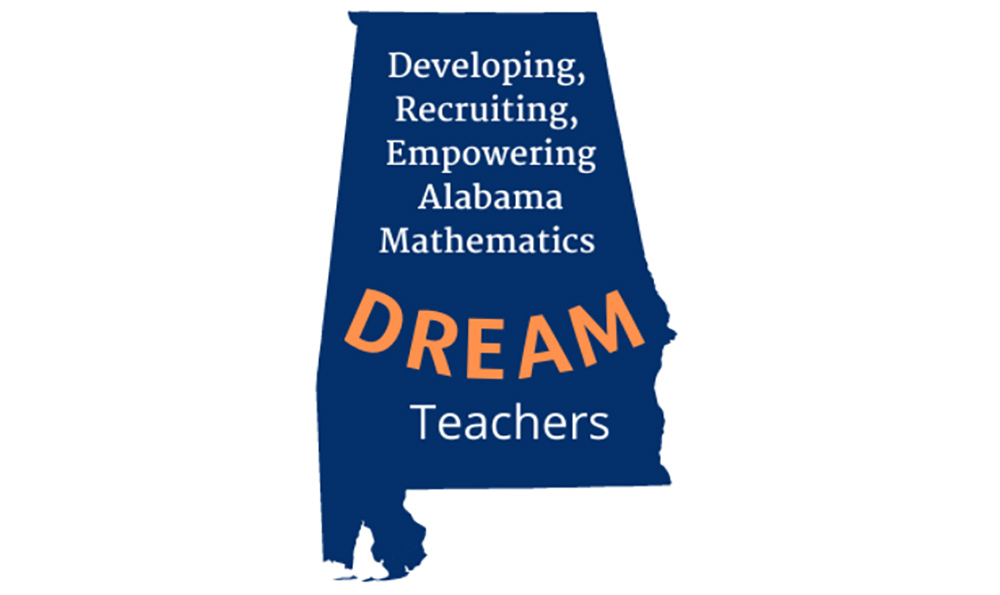National Science Foundation-funded program aims to recruit educators into pipeline
CONTRIBUTED BY
NEIL REID / AUBURN UNIVERSITY
Auburn University’s College of Education is joining forces with the College of Sciences and Mathematics’ Department of Mathematics and Statistics and other state institutions to address the shortage of mathematics teachers in Alabama.
Using $3.2 million in funding provided by the National Science Foundation’s Noyce Scholarship Program, Auburn is partnering with Tuskegee University, Alabama State University, the Alabama Math, Science and Technology Initiative, or AMSTI, the East Alabama Regional Inservice Center, or EARIC, and area school districts on a groundbreaking project titled “Developing, Recruiting and Empowering Alabama Mathematics Teachers,” or DREAM-Math. The program will offer a Master of Education in secondary mathematics that will lead to teacher certification and four years of support as teachers embark on their careers at high-need schools.
DREAM-Math project leaders are looking for recruits to fill the program’s first cohort, which will begin in May. Cohort members will complete 36 credit hours during a four-semester period leading to master’s-level teaching certification and will receive a stipend that will cover tuition, fees and living expenses during their instruction. They also will be provided $10,000 annually for each of the first four years of their teaching careers at a high-need school upon completion of the program.
“Too often people who may be interested in shifting to a career as a mathematics teacher face almost insurmountable hurdles, including time and expense,” said W. Gary Martin, the Emily R. and Gerald S. Leischuck distinguished professor for critical needs in education in Auburn’s College of Education. “DREAM-Math offers a streamlined, high-quality preparation program along with financial support from the National Science Foundation to help them achieve that dream.
“Creating a program like DREAM-Math requires the involvement of many partners to recruit participants, to effectively prepare them to be mathematics teachers and to support them as they begin their careers. Along with many other partners, eight surrounding school districts have been integrally involved in the development of this program.”
Cohort candidates must be science, technology, engineering and mathematics, or STEM, graduates with 15 to 18 hours of math — at or above Calculus 1 — who do not have teaching certificates, and they must apply for graduate school by April 30. Administrators are waiving the Graduate Record Examination, or GRE, for applicants, but candidates must earn an acceptable score on the Praxis II test to be admitted into the program.
“If we can attract potential people from our local community to pursue mathematics teaching, they may be more likely to return to our school and stay on for the long run,” said Beverly Price, deputy superintendent of teaching and learning for Alexander City Schools, a DREAM-Math partner. “We are excited for this opportunity to work with Auburn University and the other partners on this promising endeavor.”
By creating the cohort, DREAM-Math project leaders hope to help feed the pipeline of mathematics educators and fill the crucial need for teachers throughout the state. Program organizers will be reaching out to alumni and students from the participating universities, K-12 school districts and state agencies to help recruit candidates for the cohort.
“As a leading state institution with a land-grant mission, Auburn University is committed to resolving the mathematics teacher shortage dilemma,” said College of Education Dean and Wayne T. Smith Distinguished Professor Jeffrey Fairbrother. “By partnering with Tuskegee University, Alabama State University and other leading organizations, we will do our part to improve the state’s educational system and build a better future for Alabamians who seek a quality education. I applaud the efforts of our faculty, staff and leadership, as well as the National Science Foundation, for addressing this pressing need, and I am confident we will be successful with this endeavor.”
According to experts, the lack of STEM teachers throughout Alabama has been amplified by the COVID-19 pandemic, high turnover rates and the lack of qualified and certified candidates. The DREAM-Math project aims to reverse that trend and strengthen the state’s group of mathematics educators.
“As the acting department head and a mathematics education faculty member, I frequently get calls from schools that desperately need a mathematics teacher,” said Marilyn Strutchens, the Emily R. and Gerald S. Leischuck endowed professor for critical needs in education and Mildred Cheshire Fraley distinguished professor. “DREAM-Math was developed to provide a boost in the number of new mathematics teachers to help meet this urgent need.”
The DREAM-Math program has the full support of Auburn’s senior leadership.
“The DREAM-Math project embodies Auburn’s commitment to the people of Alabama and will equip science, technology, engineering and mathematics teachers to address the critical education needs in our state,” said Auburn Senior Vice President for Advancement John Morris, who serves as president of the Auburn University Foundation and Auburn University Real Estate Foundation. “The work of Dr. Martin and his colleagues through the DREAM-Math project will create a much-needed pipeline of exceptional students—future STEM educators—and address the continuing shortage of well-prepared, diverse mathematics teachers in Alabama’s schools and districts. We are committed to the success of the DREAM-Math Teachers Project and believe this work will have a significant impact on the lives of students, families and communities throughout the state.”
Auburn and its partners are looking for a dozen participants in the 2022 cohort and 14 for the 2023 cohort. Anyone interested in participating in the program may apply through its website or contact co-principal investigators Martin at martiwg@auburn.edu or Strutchens at strutme@auburn.edu.

